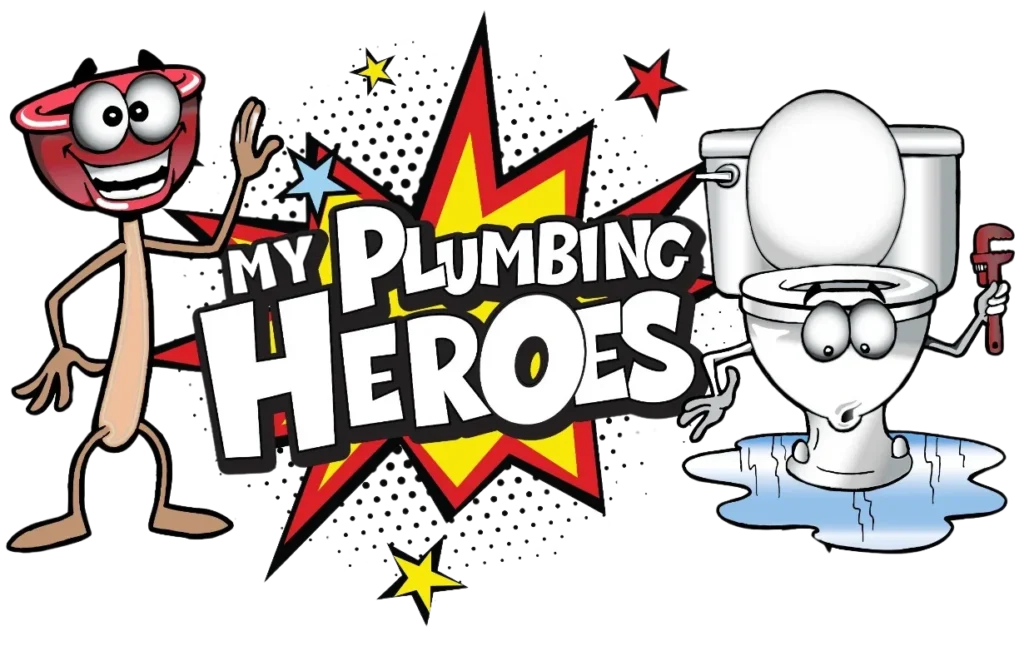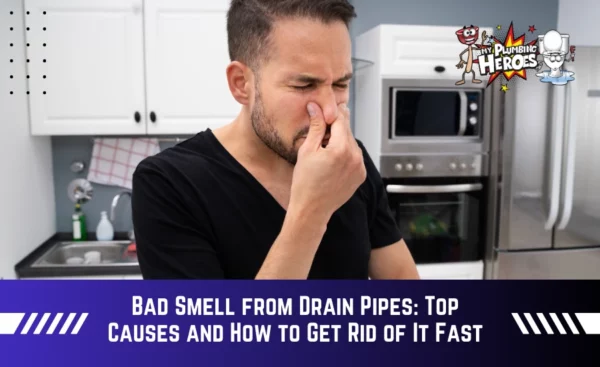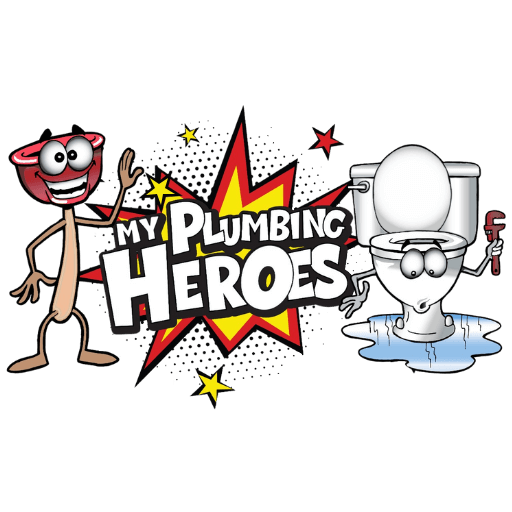A bad smell from drain pipes is not just a minor inconvenience it can signal bigger plumbing issues. Foul odors coming from your kitchen sink, bathroom drain, or other pipes in your home might be caused by bacteria, clogs, or even a broken vent pipe. If you’re dealing with a bad smell from drain pipes and need professional help, consider scheduling a drain cleaning service to get to the root of the problem and keep your home odor-free.
- Common Causes of Bad Smell from Drain Pipes
- Dry P-Trap
- Sewer Line Problems
- Venting Issues
- Identifying Different Odors: What Each Smell Means
- Rotten Egg Smell
- Musty or Moldy Odor
- Sewage Smell
- DIY Methods to Get Rid of Bad Smell from Drain Pipes
- Boiling Water Flush
- Baking Soda and Vinegar Solution
- Hydrogen Peroxide Treatment
- Enzyme-Based Cleaners
- How to Fix and Prevent a Dry P-Trap
- Restoring Water in a Dry P-Trap
- Preventing a Dry P-Trap
- Troubleshooting Sewer Line Problems: When the Issue is Serious
- Signs of a Sewer Line Problem
- When to Call a Professional Plumber
- Handling Vent Pipe Issues: DIY Steps and Professional Fixes
- DIY Steps to Handle Minor Vent Blockages
- When to Call a Professional for Vent Pipe Issues
- Tailored Solutions for Smelly Drains in Specific Areas
- Kitchen
- Bathroom
- Laundry Room
- Maintaining Odor-Free Drains: Long-Term Prevention Tips
- Regular Cleaning
- Avoid Dumping Problematic Items Down the Drain
- Use Enzyme-Based Cleaners
- Monitor Unused Drains
- Quick Tips to Keep Your Drains Smelling Fresh
- Frequently Asked Questions
- How do I stop my drains from smelling like rotten eggs?
- Why does my drain smell like sewage?
- Can I pour boiling water down the drain to eliminate the bad smell?
- Are baking soda and vinegar safe for smelly PVC pipes?
- Why does my drain smell come and go?
- Get Professional Help for Bad Smell from Drain Pipes
Bad smells in drain pipes can range from a rotten egg smell to a sewage smell or even a musty odor. Each type of smell points to a different cause. In this post, we’ll look at the main reasons for bad drain odors and give simple steps to fix them. We'll also show you how to stop drain pipes from smelling in the future and highlight when it’s time to call a professional plumber.
Common Causes of Bad Smell from Drain Pipes
A bad smell from drain pipes can stem from several issues, including dry P-traps, blocked sewer lines, and venting problems. Understanding these causes is the first step in eliminating the odor and keeping your drains clean and fresh. Below are the four most common causes of bad drain smells and how to address them.
Dry P-Trap
A dry P-trap is one of the most common reasons for sewer gas smells in the home. The P-trap is a U-shaped pipe under your sink designed to hold a small amount of water. This water is a barrier that blocks sewer gases from traveling up the drain. If the P-trap dries out, those gases can enter your home, making the drain smell like sewage.
- Solution: Run water through the drain for a few seconds to refill the P-trap. If you rarely use the sink, pour water down the drain at least once a week.
- Prevention Tip: Add a small amount of mineral oil to the P-trap for less frequent drains (like in guest bathrooms) to slow evaporation and keep your drain pipe odor-free.
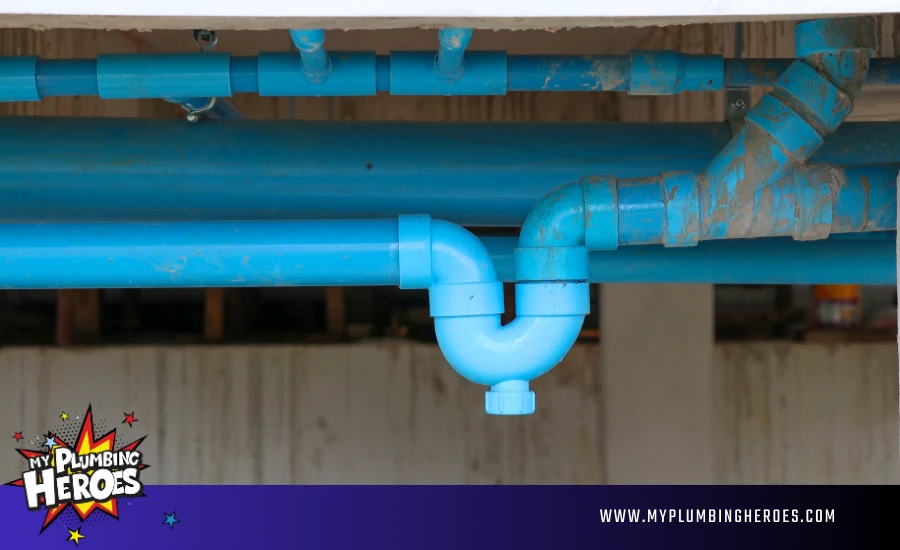
Sewer Line Problems
A blocked sewer line can cause bad smells from multiple drains in your home. This problem is more serious because it can lead to backups and property damage. Signs of a blocked sewer line include slow draining, gurgling noises, and a persistent bad smell from sink drain areas.
- Solution: If you notice these signs, it’s best to call a professional plumber. They may use a video inspection camera to find the blockage and remove it with specialized tools.
- Prevention Tip: Avoid flushing non-flushable items or pouring grease down the drain, which can contribute to sewer line blockages.
Venting Issues
Venting pipes are part of your home’s plumbing system and help balance air pressure, allowing water to flow smoothly through the pipes. When these vent pipes get blocked by debris, nests, or snow, sewer gases can’t escape properly, causing a sewer smell that comes and goes.
- Solution: If you suspect a venting issue, it’s best to call a plumber, as vent pipes are often hard to reach. They may use a special camera to inspect the vent pipes and clear any obstructions.
- Prevention Tip: Regularly inspect your vent pipes (often found on the roof) to ensure they are blockage-free to avoid smelly drain pipes.
Identifying Different Odors: What Each Smell Means
Understanding the type of smell coming from your drain pipes can help you pinpoint the exact problem. Some odors, like a rotten egg smell or musty odor, have specific causes, while others may indicate more severe issues. Below, we’ll cover the most common types of drain odors and what each one means.
Rotten Egg Smell
A rotten egg smell is usually a sign of hydrogen sulfide gas buildup caused by bacteria breaking down organic material in the drain pipes. This is most common in kitchen drains because food particles get trapped and decompose.
- Solution: Pour a mix of baking soda and vinegar down the drain to break up the buildup. After it foams up, flush with hot water.
- Prevention Tip: Use drain strainers to catch food particles and clean your kitchen sink regularly to prevent drain smells like sewage from coming back.
Musty or Moldy Odor
A musty odor often means mold or mildew grows in your drain pipes. This smell is more common in bathroom sink drains because of the constant moisture and buildup of soap scum and hair.
- Solution: Pour half a cup of baking soda followed by a cup of vinegar down the drain. Let it sit for 20 minutes, then rinse with hot water. If the smell persists, use a hydrogen peroxide solution to kill any remaining mold spores.
- Prevention Tip: Keep your bathroom well-ventilated and run hot water down the drains once a week to avoid smelly drain pipes.
Sewage Smell
A sewage smell might point to a more serious problem, like a cracked vent pipe or a broken seal around your toilet. This smell is usually strongest in the basement or lower floors of the home and can lead to long-term plumbing damage.
- Solution: Check the area for leaks or cracks. If the smell comes from your toilet, reseal the toilet base with caulk. If you can’t find the source, call a plumber.
- Prevention Tip: Inspect seals around your toilets regularly and fix any visible cracks in pipes to keep the drain pipe odor-free.
DIY Methods to Get Rid of Bad Smell from Drain Pipes
It’s important to know how to eliminate bad smells from drain pipes using safe and effective methods. The following DIY techniques are easy and can help eliminate common drain odors. Use these methods to tackle kitchen sink smells, bad smells from bathroom sink drains, or any other smelly drain pipes in your home.
Boiling Water Flush
However, boiling water should not be used on PVC pipes, as it can damage them over time.
- Step 1: Boil a kettle or pot of water.
- Step 2: Slowly pour the boiling water directly into the drain.
- Step 3: Repeat, allowing each flush to clear the buildup.
Baking Soda and Vinegar Solution
This classic combination breaks down organic material and neutralizes bad odors. It’s especially useful for smelly drains in kitchens and bad smells from shower drains.
- Step 1: Pour half a cup of baking soda into the drain.
- Step 2: Follow with a cup of white vinegar.
- Step 3: Allow the solution to foam and sit for 15-20 minutes.
- Step 4: Flush the drain with hot water to remove any remaining residue.
Hydrogen Peroxide Treatment
Hydrogen peroxide is ideal for handling musty odors caused by mold or mildew growth in bathroom drains. It disinfects and breaks down the bacteria, making it a powerful solution for smelly drain pipes.
- Step 1: Pour half a cup of hydrogen peroxide down the drain.
- Step 2: Let it sit for about 10 minutes.
- Step 3: Rinse with hot water to remove any remaining bacteria.
Enzyme-Based Cleaners
Enzyme-based cleaners are gentle yet effective at breaking down organic materials in smelly drain pipes. These are the best products to eliminate drain pipe odor without harming your plumbing.
- Step 1: Choose a high-quality enzyme-based cleaner that is safe for your type of pipe.
- Step 2: Follow the instructions on the product label, typically pouring it down the drain and letting it sit overnight.
- Step 3: Rinse with warm water the next day to keep the drain pipe odor-free.
How to Fix and Prevent a Dry P-Trap
A dry P-trap is a common cause of sewer gas smells in rarely used sinks, like in guest bathrooms or laundry rooms. The P-trap needs water to act as a barrier against sewer gases, so when it dries out, it loses this function and causes a sewer smell from the kitchen sink drain or other parts of the house. Knowing how to fix bad smells from drain pipes caused by a dry P-trap can prevent long-term odor issues.
Restoring Water in a Dry P-Trap
- Step 1: Pour about a quart of water into the dry P-trap to restore the water seal.
- Step 2: Add a few tablespoons of mineral oil on top of the water to slow evaporation.
- Step 3: Repeat this process if the sink is not used regularly.
Preventing a Dry P-Trap
- Use water-seal additives, which are specifically designed to keep the P-trap full for longer periods.
- Run water through the drain weekly, especially in guest bathrooms or other seldom-used sinks.
- Use the mineral oil method if water is evaporating too quickly.
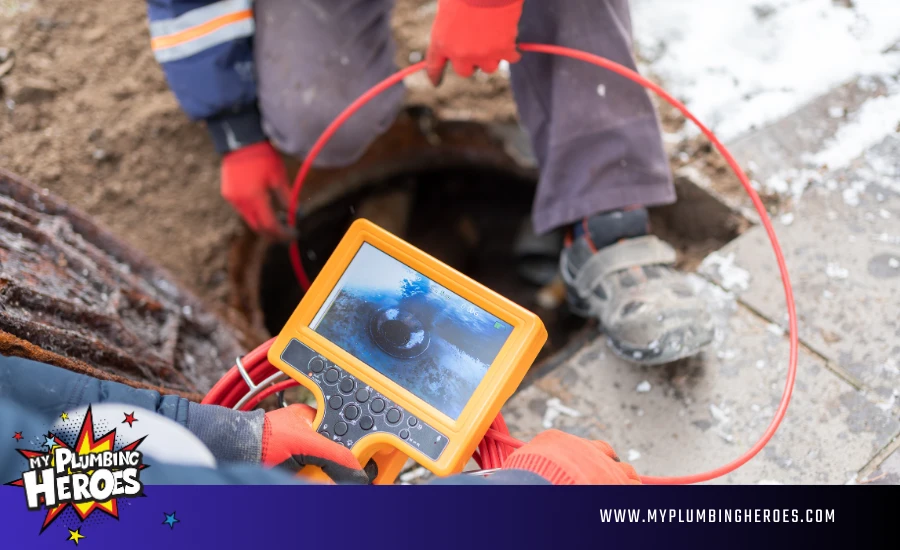
Troubleshooting Sewer Line Problems: When the Issue is Serious
A sewer line blockage is one of the most serious causes of bad smell from drain pipes. If the issue affects multiple drains, it could be a sign that the main sewer line is clogged or damaged. This problem usually needs a professional to diagnose and fix, as it may require specialized equipment.
Signs of a Sewer Line Problem
- Multiple Smelly Drains: If more than one drain emits a foul odor, it’s likely due to a sewer line issue.
- Gurgling Sounds: This noise indicates air trapped in the pipes, which happens when the line is blocked.
- Slow Draining: Consistently slow drains across your home indicate that something obstructs the main sewer line.
When to Call a Professional Plumber
If you notice these signs, it’s time to call a professional. A plumber can use a sewer camera inspection to locate the blockage and decide on the best action, such as hydro-jetting or trenchless sewer repair.
Handling Vent Pipe Issues: DIY Steps and Professional Fixes
Vent pipes are essential for preventing a bad smell from drain pipes by allowing sewer gases to escape outside the home. When vent pipes are blocked by debris, nests, or snow, the gases cannot escape properly, causing a sewer smell that comes and goes. This issue can often be mistaken for a clogged drain or a dry P-trap, so it’s important to know how to fix the bad smell from drain pipes when venting issues are the cause.
DIY Steps to Handle Minor Vent Blockages
- Step 1: Check for visible blockages on vent pipes located on the roof.
- Step 2: Use a long brush or hose to remove any nests, leaves, or debris blocking the vent opening.
- Step 3: If the blockage is not visible, use a plumber’s snake to clear deeper obstructions.
- Step 4: Flush the vent pipe with water to ensure it is clear and functioning properly.
When to Call a Professional for Vent Pipe Issues
If you cannot locate the blockage or if the smell persists after clearing visible debris, it’s best to call a professional plumber. They can use specialized tools, like a vent camera, to inspect the entire venting system and clear hard-to-reach blockages. Regular vent pipe maintenance will help keep your drain pipe odor-free and prevent sewer gases from entering your home.
Tailored Solutions for Smelly Drains in Specific Areas
Different areas of your home can have unique odor issues depending on the type of materials and buildup in the pipes. Kitchens, bathrooms, and laundry rooms are the most common areas where smelly drain pipes occur. Here’s how to target each area specifically.
Kitchen
Kitchen drains are prone to bad smells from drain pipes due to food particles, grease, and organic matter buildup. If not cleaned regularly, this can make the kitchen sink drain smell like rotten eggs.
- Solution: Mix baking soda and vinegar, followed by boiling water, to break down the grease and organic materials. Clean the garbage disposal by grinding up ice cubes and a few lemon slices to eliminate odors and keep the blades sharp.
- Prevention Tip: Install a drain strainer to catch food particles, and avoid pouring grease or oil down the kitchen sink to prevent the kitchen sink drain smells bad.
Bathroom
Hair, soap scum, and toothpaste buildup can cause bad smells from bathroom sink drains and shower drains. These materials can create a blockage and lead to a musty odor if not addressed.
- Solution: Use a drain snake to clear hair and other debris. Follow with a solution of baking soda and vinegar, then flush with hot water to remove soap scum and eliminate smelly bathroom drains.
- Prevention Tip: Use a hair catcher in the shower drain and regularly clean your bathroom sinks to prevent buildup.
Laundry Room
Stagnant water and lint buildup in the laundry room can cause a musty odor in the drain pipes. This is often due to detergent residue or mildew growing in the washing machine hoses.
- Solution: Run an empty cycle in the washing machine using hot water and two cups of white vinegar to break down residue. Clean the drain trap and lint filter to prevent odors from returning.
- Prevention Tip: Regularly inspect washing machine hoses and run hot water through the laundry room drain once a month to keep it fresh and odor-free.
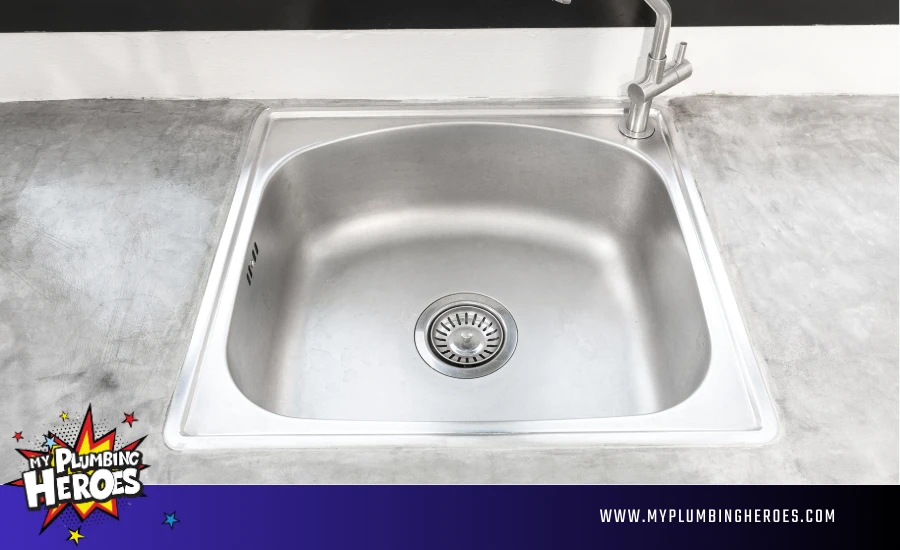
Maintaining Odor-Free Drains: Long-Term Prevention Tips
Maintaining odor-free drains requires regular care and good plumbing habits. Taking the time to use preventive measures can save you the hassle of dealing with persistent bad smells from sink drains or smelly drain pipes in the future. Here are a few effective ways to keep your drains fresh.
Regular Cleaning
- Use baking soda and vinegar monthly to break down organic buildup and keep the drains clean.
- Flush drains with hot water weekly to prevent soap scum and grease buildup.
Avoid Dumping Problematic Items Down the Drain
- Never pour grease, oils, or coffee grounds down the drain, as these can harden and cause clogs.
- Avoid putting hair, large food particles, or fibrous materials (like potato peels) into the sink, as they can get stuck and create a drain pipe odor.
Use Enzyme-Based Cleaners
- Enzyme-based drain cleaners are a safe way to break down organic materials and prevent smelly drain pipes. They work by introducing good bacteria into the pipes, which digest the debris that causes the odor. For best results, use them every two months.
Monitor Unused Drains
- Check guest bathrooms or basement sinks periodically to ensure the P-traps are not drying out. Add water to the traps regularly and consider using water-seal additives to prevent bad smells from shower drains and rarely used sinks.
Quick Tips to Keep Your Drains Smelling Fresh
Taking a proactive approach to how to get rid of bad smells from drain pipes can prevent bigger plumbing problems in the future. Regularly cleaning your drains, avoiding clogs, and maintaining proper venting can help keep your drain pipe odor-free. If you're noticing a persistent bad smell from your sink drain or other areas, don’t wait for the problem to get worse. Contact us today! We specialize in diagnosing and resolving complex drain issues. Our trusted plumbing services will keep your home fresh, safe, and free from unpleasant odors.
Frequently Asked Questions
How do I stop my drains from smelling like rotten eggs?
To stop your drains from smelling like rotten eggs, use a solution of baking soda and vinegar to break down the buildup of hydrogen sulfide gas caused by bacteria. After the mixture foams up, flush the drain with hot water to remove any remaining residue and eliminate the odor.
Why does my drain smell like sewage?
A sewage smell in your drain can be due to a dry P-trap, a blocked vent pipe, or a serious issue with your sewer line. Inspect each component carefully, and if you can’t locate the problem, call a professional plumber to prevent further complications.
Can I pour boiling water down the drain to eliminate the bad smell?
Yes, pouring boiling water down the drain can help clear minor clogs and eliminate odors. However, avoid using boiling water if your pipes are made of PVC, as high temperatures can soften and damage the material over time.
Are baking soda and vinegar safe for smelly PVC pipes?
Yes, baking soda and vinegar are safe for most plumbing systems, including PVC pipes. They provide an effective, non-corrosive way to eliminate odors if you avoid using boiling water afterward, which could harm PVC.
Why does my drain smell come and go?
If the smell from your drain comes and goes, it could be due to a partial vent pipe blockage or an occasionally dry P-trap. Check for both issues, as either can lead to an inconsistent odor that varies based on airflow or water usage.
Get Professional Help for Bad Smell from Drain Pipes
If your drains continue to emit bad odors even after using these methods, it’s a sign that you need professional help. A licensed plumber can accurately diagnose and fix complex issues like blocked sewer lines or venting problems. For reliable plumbing services, contact My Plumbing Heroes today. Schedule your drain cleaning service today to tackle the root cause and keep your plumbing system in top condition.

